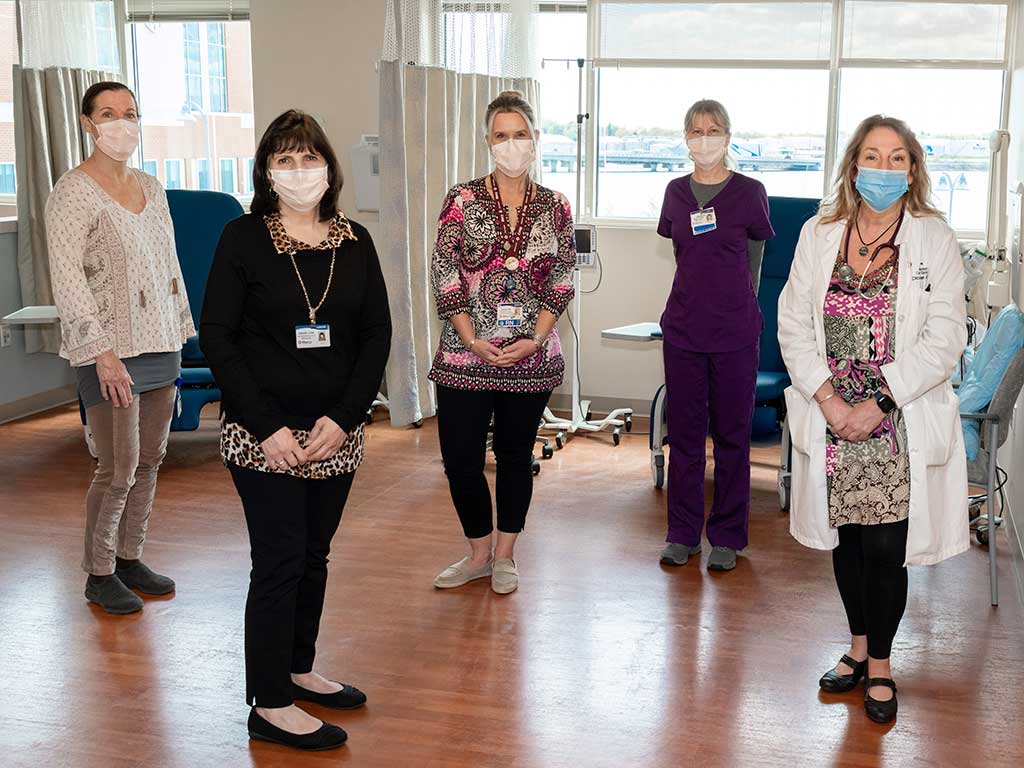Surviving Cancer: What’s Next?
By the medical team at Northern Light Mercy Cancer Care

All of us, or someone close to us, has likely been touched by a diagnosis of cancer. “Survivor” is a word that can be used to describe someone who was treated and no longer has cancer or is living with cancer now. About 17 million people in the United States are cancer survivors. And they are living longer and more productive lives than ever.
June is National Cancer Survivor Month, and it’s important to recognize that surviving cancer can result in a range of experiences. It can be traumatic, provide an opportunity for growth, or be somewhere in between. Regardless of the path it takes, surviving cancer can be a transformative experience emotionally and physically.
Trying to get back to “normal”
Common concerns for many survivors focus on managing fears that cancer might return or that concentration or energy are not as good as they once were. It may take a while to find a balance between managing these concerns and moving forward with the “new normal” of life. This is especially true if physical fatigue or discomfort from cancer treatments are taking a while to go away.
Some are surprised to realize they have mixed feelings about ending their treatment. While they are happy to have it over, they need to adjust to changes in routines and less frequent contact with their medical team.
Once time and energy are more available to a survivor, they and their loved ones may be thinking about what is most important to them in life. This assessment of priorities is very normal, and it can be helpful to consider expressing these thoughts to a trusted friend, in a journal, or through other creative work.
Support for survivors
A patient’s medical team includes a social worker for counseling. Therapists, clergy, and support groups can also help sort out feelings during the transition to healthy survivorship.
Practical ways to manage these concerns start by using relaxation as the foundation for clear thinking and problem solving. Setting aside some time each day, even a few minutes, for doing something relaxing can make a big difference. For example, breathing exercises, meditation, prayer, or any activity that relaxes the body and mind is a good start.
Taking control of worrisome thoughts by gathering facts can help move beyond unrealistic concerns. Making reasonable plans while remaining flexible can help us manage easing into new routines. And remaining in the moment by being mindful and focused on the next task can help get through even the most challenging situations. Relaxation and rest may help with any short-term memory problems, too.
Occupational and physical therapy can be a big help in learning how to manage fatigue, getting around, poor balance, swelling, or difficulty concentrating. This type of therapy can help survivors get back to doing the things most important to them. Getting regular exercise has a protective effect on health, and it may boost energy and mood.
Support for survivors is also available from registered dieticians. More than just diets, survivors can receive assistance with healthy lifestyle changes, including how to shop within a budget for tasty and nutritious meals.
Readjusting to life
Being a cancer survivor sometimes requires increased attention to relationships with family and friends. Survivors might be treated like they can’t do as much for themselves as they once did. Or friends and relatives may not understand the real challenges survivors are going through, especially if they “look good” on the outside. Caregivers may be adjusting to their changing roles as well, wondering what they need to do to be most helpful.
Survivorship may also require coming to grips with the financial impact of cancer. Changes in employment are often on the minds of survivors. They may be wondering if their work is fulfilling or whether they have the energy to do it. While financial situations may have changed since first being diagnosed, the medical team’s social workers and financial counselors can help a lot with these concerns.
A team to lean on
If you or a loved one are a cancer survivor, you’ve been through a lot and learned much. We encourage you to celebrate your accomplishments and use this occasion for personal growth and exploration. Please remember that the care team at Northern Light Mercy Cancer Care will always be available to you for support.
Content Provided By
Northern Light Mercy Hospital is a nonprofit community hospital sponsored by the Sisters of Mercy. Northern Light Mercy Hospital is a paid advertiser.





